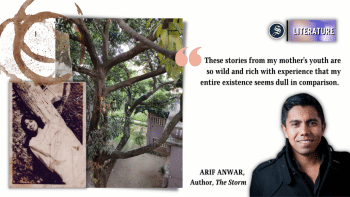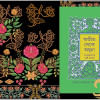In Extreme Need of Guidance

On summer days when the sunlight falls through the trees it scatters into a play of light and shadows on the ground. My memories of Fareed are like that. I'll try my best to stitch them into coherence here.
I first met him in Lahore. There was a visiting room near the main gate for the student's families, relatives and concerns to meet them there. Once someone arrived there, they would send a message to the student through a college employee. I would sit and watch as the other girls in the college (from both wings from Pakistan) received visitors. I didn't have anyone visiting me, but I wasn't bothered by this. I didn't feel sad, lonely, or envious. Rather I observed the interactions of the other students and their loved ones with great amusement.
On one of these visiting days, a senior East Pakistani student named Sabiha Ahmed was visited by an older cousin who was her local guardian. When she saw me hanging around she asked me if I wanted to come with her and meet him. I saw a tall, handsome man who had come to see her. He was, I thought, about 25 years old. She introduced us, referring to him as Fareed Bhai. I introduced myself and stood by as they chatted, laughed and argued playfully. I observed their relationship with awe.
For the next few weeks, Sabiha kept inviting me along for these sessions. Although the first day we did not speak, I engaged Fareed more and more in conversation, to the point where I asked him to also be my local guardian along with Sabiha. I asked this while she was standing right next to us, because my intention was innocent, leaving the college to visit the city was my only motive, as only the local guardians were permitted to take the students out of the campus. Fareed agreed readily. He told me that I would come and pick up on holidays. I didn't think that this would be an issue with Sabiha as she had so many local acquaintances and relatives. But as I later discovered, that assumption was wrong.
Initially, Fareed took me to see the many sites of Lahore. We had fruit chaat in Banu Bazar. We visited Akbar's grave. And many other places that I no longer remember. We quickly became close. Although I intended the relationship to remain platonic, I did not mention this to Fareed. At times, he would elaborate on the historical context of the sites we were visiting. I realised quickly that he was quite learned for his age. I would listen to him, and admire him in a distant way, but unfortunately his words did not touch me. I was still like a child. I would barely listen, and was annoyed by advice given to me in a lecturing or hectoring tone, which he was wont to do. Fareed's assumption of my guardianship led to a deterioration of my relationship with Sabiha, and ruptured matters between him and her as well.
I didn't understand that I had found a rare man. Even by the standards of my young age, I was quite inconsiderate, thoughtless. To my young mind, the entire Lahore chapter of my life was an escapade, a holiday, a way to avoid the punitive presence of my maternal grandparents. I rarely thought beyond the day that lay before me. My ability to plan long-term was non-existent.
He was supremely patient with me even when my behaviour was aberrant and shocking, such as one time when I was returning from East Pakistan by PIA at the end of one of the many holidays I had taken during my stay in Lahore. Sitting beside me was a gentleman with whom I chatted casually. Even though he was speaking in English, I could tell that he was from Sylhet, so strong was his accent. In the course of our conversation I told him that I was returning early from Dhaka and that my college would not open for a few more days. He said that he was pleased to hear this as he was staying at a hotel in Lahore. "Would you like to stay with me?" he asked. I was excited by this unexpected offer as I had never stayed in a hotel before. I peppered him with questions: What did the hotel look like? How was the food? What were some things you could do there? I speculated aloud that it must be very exciting to stay in a hotel and my new friend solemnly confirmed that yes, it was.
I spent the rest of the flight in a state of excitement as I daydreamed about staying in a hotel. We got into a cab to go to the hotel. Halfway there however, I remembered about Fareed. I told my new friend that I would have to ask my local guardian for permission. I asked the taxi to turn around and go to Samindabad, to Fareed's mess. I left the man sitting in the taxi cab while I ran to see Fareed to tell him what had happened. Fareed said nothing to me but asked to see the man. I hung back while they talked but I was shocked to see Fareed admonish the man loudly, who, after being yelled at for some time, left meekly in the taxi without speaking to me. I was mortified by the incident, as I felt at the time that the poor gentleman had been insulted for nothing more than wanting to take a young girl on a tour of a hotel, but I said nothing, fearful of angering Fareed further. But he said nothing to me. Maybe he knew by then just how naive I was. I stayed with him until my college opened.
During my visits to East Pakistan Fareed would arrange everything. There were times when he paid for everything related to me, but I was completely oblivious to it. It never even occurred to me to enquire how my expenses were met, much less to offer to pay for myself, even though I received a massive monthly stipend as part of my scholarship.
Despite my naivete I knew that Fareed was never romantically interested in any woman but me. The proof of this was once when we went to Banu Bazaar. Fareed happened to give some money to a beggar woman. She prayed in Punjabi to Allah in thanks. Fareed then translated her prayers–that we would have many sons. I laughed upon hearing this but said nothing else.
He wrote me many letters, full of warmth, substance and wisdom. Fareed was fluent in Bangla, English and Urdu–I remember that when he would bring me fruits such as oranges had 'suruk inside', meaning red. I would also discover that he was an exceptional letter writer who wrote long letters that were well-composed and written with an immaculate hand, always arriving in blue envelopes with paper of a similar hue. These letters were steeped in detail, in the history and the import of the places he had seen. Fareed would enclose many photographs of different places he was visiting. One of them was in Chitral where he was frolicking in the snow in a nice hat and warm clothes. Often they contained advice that was precocious for someone of his young age. The times he would write to me while I was in East Pakistan my father would read these letters first and then hand them to me. If only I had preserved them.
There was a senior East Pakistani student named Mariam Mahmud at my college in Lahore. Thin, with a doll-like face, she was exceptionally beautiful. For some reason she began stealing Fareed's letters when they would arrive in the common mailbox. She did this openly, reading the letters and then discussing them with impunity with the other students. Fareed was incensed when I told him what was happening. In a following letter he wrote: "This is a short letter but it is deep with emotions and things left unsaid as I am concerned that your Mariam Apa might read it." This was the only letter that Mariam returned to me.
What no one knew until now is that I was so furious at Mariam that I plotted to kill her. I stole a knife from the kitchen and was determined to stab her with it. I was very close to going through with it, until I examined the knife more closely and noticed how flimsy it was. That was the only reason I didn't proceed with the murder attempt. Like much else in life, I had very fanciful and romanticised conceptions of homicide. I didn't think there would be any adverse consequences if I killed Mariam. I thought life would go on as normal, perhaps even improve because she would no longer be stealing my letters.
Amazingly, a few months down the road the same Mariam would give me a box to take to Dhaka on her behalf as I was travelling there. The box was unlocked. I opened it to find many letters addressed to Mariam from her lover, whose name I no longer recall. I was amazed that she would trust me with them. I exacted my vengeance on her by ripping up some of these letters.
Fareed could occasionally be patronising. He was, after all, quite young. Sometimes he delivered needling comments so subtly that I would miss the meaning but intuitively understand that I had somehow been insulted. In fact, one of his obsessions–that I become a graduate, began to grate on me. I thought it was putting the cart before the horse to worry about my bachelors when I had not even finished my intermediate. Perhaps some of his fears about marrying me played into it. He was Sylheti, a people who are infamous for marrying only within their clans and locales. He may have been afraid of breaking that norm. He confessed at one point that he was obliged to marry someone within his extended family, but that he was not interested in her. Her name may have been Nazma, the heir of a vast fortune, but Fareed did not find it an appealing proposal.
Although he was wise beyond his years and broad minded, he was still only 26, and as mature as he was for his age, I was immature for mine. This bothered him. He would exclaim often, following an episode of a childish statement, deed, question, or other instances of general naivete from me, that I was "in extreme need of guidance".
He was meticulously clean, unable to abide even a spot of dirt in his house. If he noticed any spots on the floor he would immediately set to clean it with a mop, soap and water. He was adept in English, completely fluent, and taught me turns of phrase with which I had no familiarity, such as the 'waxing and waning moon'. These lessons were conducted in the rear courtyard of his mess in Saminabad, under the shade of a henna tree. He would put out two chairs and we would sit there dappled in moonlight while he helped me practise my English. I found these sessions tedious and would try to escape them by feigning sleepiness, but even this he would seize as a teachable moment by asking me to translate my request to English.
"I will go to sleep," I would say and he would correct me. "No, you should say 'I will go off to sleep.'"
I would go into his bathroom and use his cosmetics. I would slap his aftershave on my face. His antiperspirant sticks I was less sure about so I would apply them to my hair, thinking that was where it was meant to go. I liked its scent.
I would eat three or four times daily at the officer's mess but I never wondered who was taking care of the bill. Rather, I was eating more oatmeal porridge than was allotted for me, as I had suddenly developed a liking for that dish. After breakfast I would come down to my room and he would later follow with two cups of tea. He would sit on the sofa and we would chat. I would be on the bed. He would ask me if he could put his feet on the edge of my bed and I would say yes. He would often be cold so he would be rubbing his hands.
Although he had his own quarters the larger building was shared between him and other officers. They were kind and upstanding men. They never spread any salacious or ugly rumours about us. I got to meet some of these friends one day. I was in my room at his place when Fareed came in. Some of his friends were visiting him, would it be ok if they came in to say 'hello'? I said it would be fine but didn't bother to get up. Even when his friends came into the room I barely acknowledged them. I stayed in bed, flipping through a magazine. Fareed seemed embarrassed by my behaviour but didn't seem to know what to do about it. Later, he calmly told me that I had been rude, but rather than feel remorse I was annoyed that people would have the temerity to complain after coming into my room. These were some of the ways that Fareed tried to make me more civil, a better person. None of it worked.
While at Fareed's, like elsewhere, I behaved like a child. I would be irritated if he ever asked me to do anything, because while I loved behaving as a child, I despised being treated as one. Once when he told me to fetch some matches from the kitchen so he could light his pipe, I peevishly told him that I didn't know what to say to the Urdu-speaking khansama. He told me to go to the man and say, "machees dey do".
He was quite lean, which back then was a cause for concern rather than celebration. He would drink some liquor based elixir that he claimed would help him put on weight. I thought this was misguided because he looked better when he was thinner. Years later when I would run into him at a party I remember being shocked to see his bearded, round face. I couldn't find my Fareed in him. His wife was with him at this same party and I found her to be pretty, smart and sophisticated. She was smoking and held a cocktail in her hand, behaviour that would be unthinkable for me.
Fareed was not my only admirer in Lahore. There were some boys (all East Pakistani) from Punjab University who were ardent fans of mine. One of them would frequently write to me expressing his affection. The feeling was not reciprocal, so I wrote back to him saying that he reminded me of a brother of mine who died when I was young. It worked. He stopped writing to me. This young man would later become Inspector General of Bangladesh Police. Another was a young man who sang with me during our Bangla cultural programs for Pakistani television. He was from Chittagong. Yet another was an engineering student named Tarek who would send me letters on lovely, expensive stationery. I loved the envelope and the paper but never properly read his letters. This same Tarek would always somehow know when I was travelling to Dhaka and show up at the airport. Once it was Fareed dropping me, and Tarek, upon seeing him, hid behind a newspaper, but Fareed noticed this and told me to go and say hello to Tarek. Otherwise it would not be polite, he said.
Fareed had manifold talents, and was a quick learner. He appreciated my devotion to music and asked me if I would teach him the harmonium. I taught him one Tagore song and in four days he was able to play it on the harmonium and sing it perfectly. When he wasn't singing Tagore his preferred music was in Urdu. He would hum them, and direct the lyrics towards me. One song was 'na mangi mei sona chandi mangi darshan debi teri duare khara ek jogi'. Another was (while showing my photo) 'tasvir teri dil mera behlana sakegi; ye teri tahra mujse to sharmana sakegi; mei baat korunga to ye khamosh rahegi; sine pe laga lunga to ye kuch na kahegi'.
Sultana Nahar is an author, lawyer, and former columnist at The Daily Star.

 For all latest news, follow The Daily Star's Google News channel.
For all latest news, follow The Daily Star's Google News channel. 











Comments